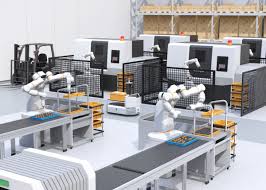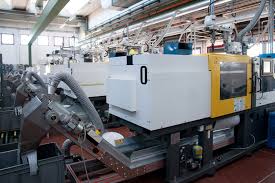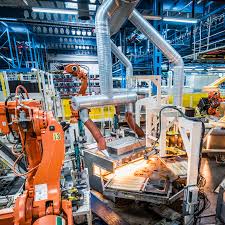
Exploring the Role and Advancements in Industrial Control Systems
Industrial control systems (ICS) are the backbone of modern manufacturing, energy, and infrastructure management. These systems enable the monitoring and control of industrial processes, from the production of goods to the management of critical infrastructure. As industries become more advanced, industrial control has evolved to incorporate cutting-edge technologies that improve efficiency, safety, and reliability.
In this article, we will explore the key components of industrial control, the various types of control systems, their applications across industries, and the benefits they offer. We will also delve into the challenges and opportunities that come with implementing industrial control systems and the future trends shaping their development.
What is Industrial Control?
Industrial control refers to the use of control systems such as programmable logic controllers (PLCs), supervisory control and data acquisition (SCADA) systems, and distributed control systems (DCS) to manage industrial processes. These systems are designed to automate tasks, monitor systems in real-time, and maintain process stability in industries like manufacturing, energy, transportation, and utilities.
At its core, industrial control is about ensuring that industrial processes run smoothly, efficiently, and safely. This can range from controlling a simple machine operation to managing complex networks of machinery and equipment in large factories or power plants.
Key Components of Industrial Control
| Component | Description |
|---|---|
| Sensors | Devices that collect data from machinery or the environment. |
| Actuators | Components that perform actions based on sensor data. |
| Controllers | PLCs or DCS that interpret sensor data and issue commands. |
| Human-Machine Interface (HMI) | Interface that allows operators to interact with the system. |
| Communication Networks | Network systems that connect various components of ICS. |
Types of Industrial Control Systems
Industrial control systems can be categorized into different types based on the scale, complexity, and nature of the tasks they handle. Below, we look at the three main types of industrial control systems commonly used in various industries.

1. Programmable Logic Controllers (PLCs)
PLCs are widely used in industrial control for managing machinery and automation processes. They are programmable digital computers designed to control industrial processes such as manufacturing lines, assembly lines, and other automated systems.
PLCs offer the following benefits:
- Flexibility: Can be easily reprogrammed to adapt to changing processes.
- Reliability: Designed to withstand harsh industrial environments.
- Real-time control: Provides immediate control over industrial machinery.
PLCs are commonly used in industries such as automotive manufacturing, food processing, and chemical production, where automation and precision are key.

2. Supervisory Control and Data Acquisition (SCADA)
SCADA systems are used for remote monitoring and control of industrial processes. Unlike PLCs, which are typically used for local control, SCADA systems enable operators to control multiple processes over large geographical areas. SCADA systems gather data from sensors and use this data to monitor and manage industrial equipment.
Key features of SCADA systems include:
- Remote access: Allows operators to monitor and control processes from remote locations.
- Real-time data: Provides operators with up-to-the-minute data on system performance.
- Data logging: SCADA systems record data for analysis and troubleshooting.
SCADA systems are often employed in utilities, water treatment plants, and oil and gas pipelines, where overseeing large-scale operations is crucial.
3. Distributed Control Systems (DCS)
Distributed control systems (DCS) are used for controlling complex processes that require high levels of integration and coordination. Unlike PLCs, DCS systems allow for the control of processes in different parts of a plant or facility, with data shared across multiple controllers.

Key benefits of DCS include:
- Decentralized control: Each part of the process is controlled independently, enhancing reliability and reducing the risk of system failure.
- Integration: DCS systems integrate multiple control elements into a single unified system.
- Scalability: Can be expanded to accommodate larger or more complex processes.
DCS is typically used in industries like power generation, petrochemicals, and large-scale manufacturing operations, where coordinated control is essential.
Applications of Industrial Control Systems
Industrial control systems are used across various sectors to optimize performance, ensure safety, and improve process efficiency. Let’s look at how these systems are applied in different industries.
1. Manufacturing
In manufacturing, industrial control systems are responsible for automating processes, controlling machinery, and ensuring that production lines operate efficiently. PLCs and SCADA systems are commonly used in assembly lines, material handling, and packaging processes. These systems improve production efficiency, reduce downtime, and ensure product quality.

Applications in manufacturing include:
- Automated assembly lines: Robotics and PLCs are used to automate assembly, reducing human labor and improving consistency.
- Quality control: Sensors monitor product quality in real-time, ensuring that defects are detected early.
- Predictive maintenance: DCS and SCADA systems monitor equipment health and schedule maintenance before breakdowns occur.
2. Energy and Utilities
In the energy sector, industrial control systems are essential for managing the generation, distribution, and consumption of energy. SCADA systems are widely used in power plants, electricity grids, and water treatment facilities to monitor and control operations remotely. These systems allow operators to optimize energy use, reduce waste, and ensure safety.
Applications in energy and utilities include:
- Grid management: SCADA systems control the distribution of electricity across the grid, ensuring efficient use of resources.
- Power plant monitoring: DCS systems are used to control turbines, generators, and other equipment in power plants.
- Water treatment: SCADA systems manage water treatment plants, ensuring safe and efficient water processing.
3. Oil and Gas
In the oil and gas industry, industrial control systems play a crucial role in managing exploration, drilling, and refining operations. These systems control complex processes such as oil extraction, refining, and transportation of crude oil. SCADA systems are often used to monitor pipelines and ensure the safe transport of oil and gas.
Applications in oil and gas include:
- Pipeline monitoring: SCADA systems track pipeline pressures, temperatures, and flow rates to prevent leaks and ensure efficient operation.
- Refinery automation: DCS systems control refinery processes, ensuring consistent product quality and safety.
- Safety systems: Industrial control systems monitor for hazardous conditions and trigger safety protocols if necessary.
4. Transportation
Industrial control systems are also widely used in transportation, particularly in traffic management and control of transportation infrastructure. SCADA systems are used to manage traffic lights, control the flow of traffic, and optimize transportation networks. These systems help reduce congestion, improve safety, and ensure smooth transportation operations.
Applications in transportation include:
- Traffic signal control: SCADA systems manage traffic lights to optimize traffic flow and reduce congestion.
- Railway monitoring: DCS systems are used to monitor train operations and ensure safe, efficient transport.
- Airport operations: Industrial control systems manage the flow of baggage, ensure runway safety, and track aircraft movement.
Benefits of Industrial Control Systems
Implementing industrial control systems offers several key benefits across industries. Some of the most notable benefits include:
1. Increased Efficiency
By automating processes, industrial control systems improve operational efficiency, reducing the need for manual intervention and minimizing human error. These systems can monitor and adjust processes in real-time, optimizing performance and reducing energy consumption.
2. Improved Safety
Industrial control systems help ensure safety by continuously monitoring equipment and processes. Sensors and control systems can detect hazardous conditions and automatically trigger safety protocols, such as shutting down machinery or alerting operators to potential issues.
3. Real-Time Monitoring and Control
With industrial control systems, operators can monitor industrial processes in real-time, making it easier to detect issues early and respond quickly. SCADA and DCS systems provide operators with continuous data feeds, enabling them to make informed decisions and improve process outcomes.
4. Cost Savings
By reducing downtime, improving efficiency, and preventing costly breakdowns, industrial control systems help businesses save money. Predictive maintenance, for example, allows companies to service equipment before it fails, reducing repair costs and extending the lifespan of machinery.
5. Data-Driven Insights
Industrial control systems collect vast amounts of data, which can be used for analysis and optimization. This data can be used to identify trends, optimize production processes, and predict future outcomes, leading to better decision-making and improved performance.
Challenges of Industrial Control Systems
While industrial control systems offer significant advantages, there are some challenges that businesses need to address:
1. Cybersecurity Risks
As industrial control systems become more connected, the risk of cyberattacks increases. Hacking attempts can disrupt operations, damage equipment, and compromise sensitive data. Ensuring robust cybersecurity measures is essential to protect industrial control systems from cyber threats.
2. Integration with Legacy Systems
Many industries still rely on legacy control systems that may not be compatible with modern technologies. Integrating new industrial control systems with older equipment can be complex and costly, requiring businesses to carefully plan for system upgrades.
3. System Complexity
Large-scale industrial control systems, such as DCS or SCADA, can be complex to design, implement, and maintain. These systems require skilled personnel and proper training to ensure smooth operations. Additionally, system failures or errors can be costly and disruptive.
The Future of Industrial Control Systems
The future of industrial control systems looks promising, with continuous advancements in automation, artificial intelligence, and machine learning. These technologies will enable even smarter systems that can predict failures, optimize processes, and adapt to changing conditions in real-time.
Key trends shaping the future of industrial control include:
- Integration of AI and machine learning for predictive maintenance and process optimization.
- Increased use of cloud computing for centralized data management and analysis.
- Greater emphasis on cybersecurity to protect connected systems from cyber threats.
- Edge computing to enable faster, more localized decision-making.
Conclusion: The Vital Role of Industrial Control Systems
Industrial control systems are essential for modern industries, enabling automation, improving safety, and enhancing efficiency. From manufacturing and energy to transportation and healthcare, these systems are transforming how businesses operate and ensuring that processes run smoothly.
As technology continues to advance, the role of industrial control systems will only grow, with new innovations providing more intelligent, adaptable, and efficient solutions for industrial operations. By addressing the challenges and leveraging the opportunities provided by these systems, businesses can enhance productivity, reduce costs, and stay competitive in the rapidly evolving industrial landscape.
